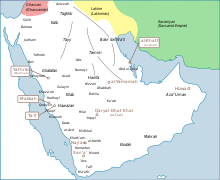
Back بنو هلال (قبيلة) Arabic Banu Hilal Catalan Banū Hilāl German Banu Hilal Esperanto Banu Hilal Spanish بنی هلال Persian Hilaliens French בנו הלאל HE Banú Hilál Hungarian Banu Hilal ID
| Banu Hilal بنو هلال | |
|---|---|
| Qaysi Arab tribe | |
| Ethnicity | Arab |
| Nisba | al-Hilālī |
| Location | Najd (origin), Maghreb, Egypt |
| Descended from | Hilal bin 'Amir bin Sa'sa bin Mu'awiya bin Bakr bin Hawazin |
| Parent tribe | Banu 'Amir |
| Population | 4,000,000 (1573)[1] |
| Branches | |
| Language | Arabic |
| Religion | Shia Islam (originally)[2] Sunni Islam (later)[3] |

The Banu Hilal (Arabic: بنو هلال, romanized: Banū Hilāl) was a confederation of Arab tribes from the Najd region of the central Arabian Peninsula that emigrated to the Maghreb region of North Africa in the 11th century. Masters of the vast plateaux of the Najd, they enjoyed a somewhat infamous reputation, possibly owing to their relatively late (for the Arabian tribes) conversion to Islam and accounts of their campaigns in the borderlands between Iraq and Syria. When the Fatimid Caliphate became the rulers of Egypt and the founders of Cairo in 969, they hastened to confine the unruly Bedouin in the south before sending them to Central North Africa (Libya, Tunisia and Algeria) and then to Morocco.
Historians estimate the total number of Arab nomads who migrated to the Maghreb in the 11th century to be to 500,000[4] to 700,000[5] to 1,000,000.[6] Historian Mármol Carvajal estimated that more than a million Hilalians migrated to the Maghreb between 1051-1110, and estimated that the Hilalian population in the Maghreb at his time in 1573 was at 4,000,000 individuals, excluding other Arab tribes and other Arabs already present.[1]
- ^ a b Leroux, E. (1886). Revue d'ethnographie (in French). p. 330.
Marmol évalue à plus d'un million le nombre d'individus que le premier flot versa en Afrique. Vers la fin du xv siècle, le nombre des Arabes répartis sur toute la surface du Maghreb s'élevait à plus de quatre millions, et l'empire du Maroc en contenait à lui seul deux fois autant que les trois autres états (Alger, Tunis et Tripoli). == Marmol estimates the number of individuals that the first flood poured into Africa at more than a million. Towards the end of the 15th century, the number of Arabs spread over the entire surface of the Maghreb amounted to more than four million, and the empire of Morocco alone contained twice as many as the three other states (Algiers, Tunis and Tripoli).
- ^ Sabatier, Diane Himpan; Himpan, Brigitte (2019-03-31). Nomads of Mauritania [Premium Color]. Vernon Press. p. 110. ISBN 978-1-62273-410-8.
- ^ Idris 1971, p. 385.
- ^ "revue tunisienne". ImgBB. Institut de Carthage. p. 314. Retrieved 2023-08-22.
- ^ Cite error: The named reference
:5was invoked but never defined (see the help page). - ^ Cite error: The named reference
:1was invoked but never defined (see the help page).